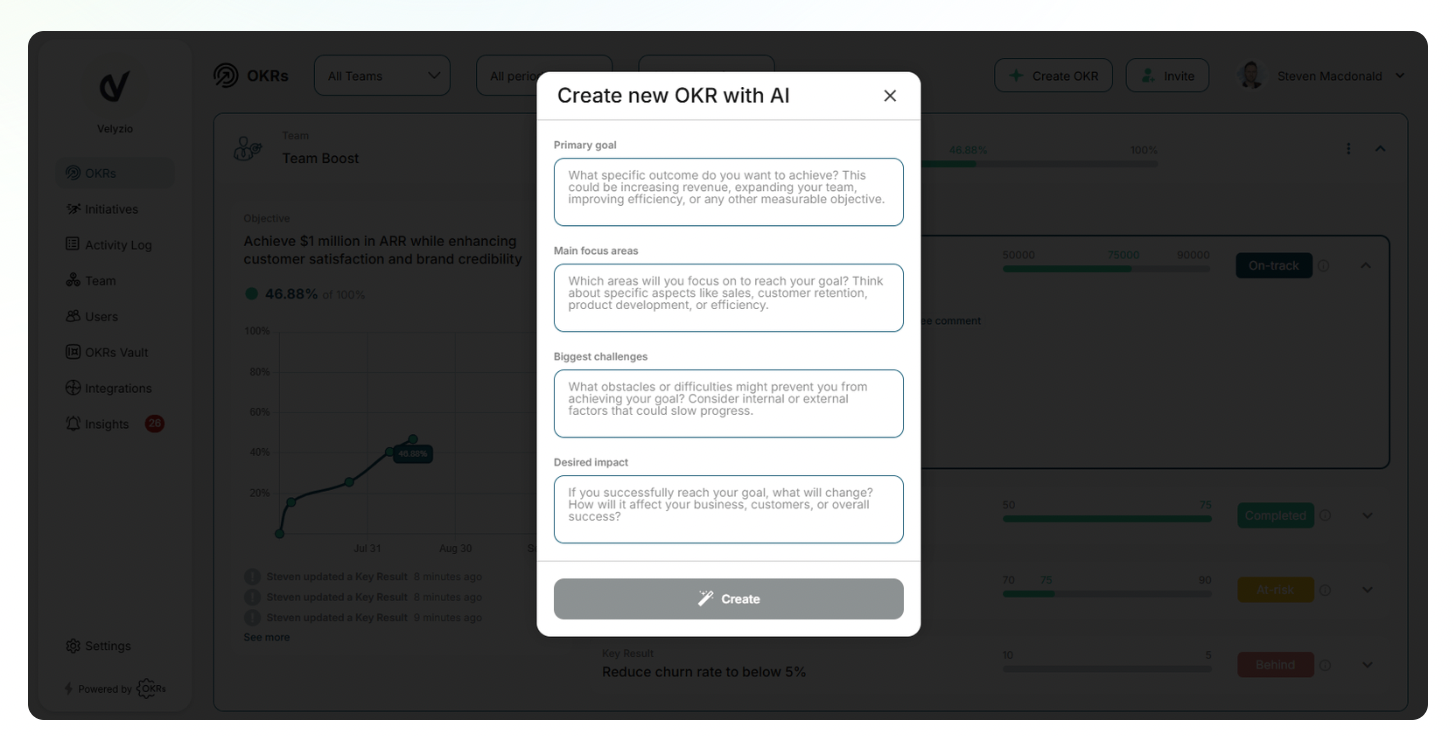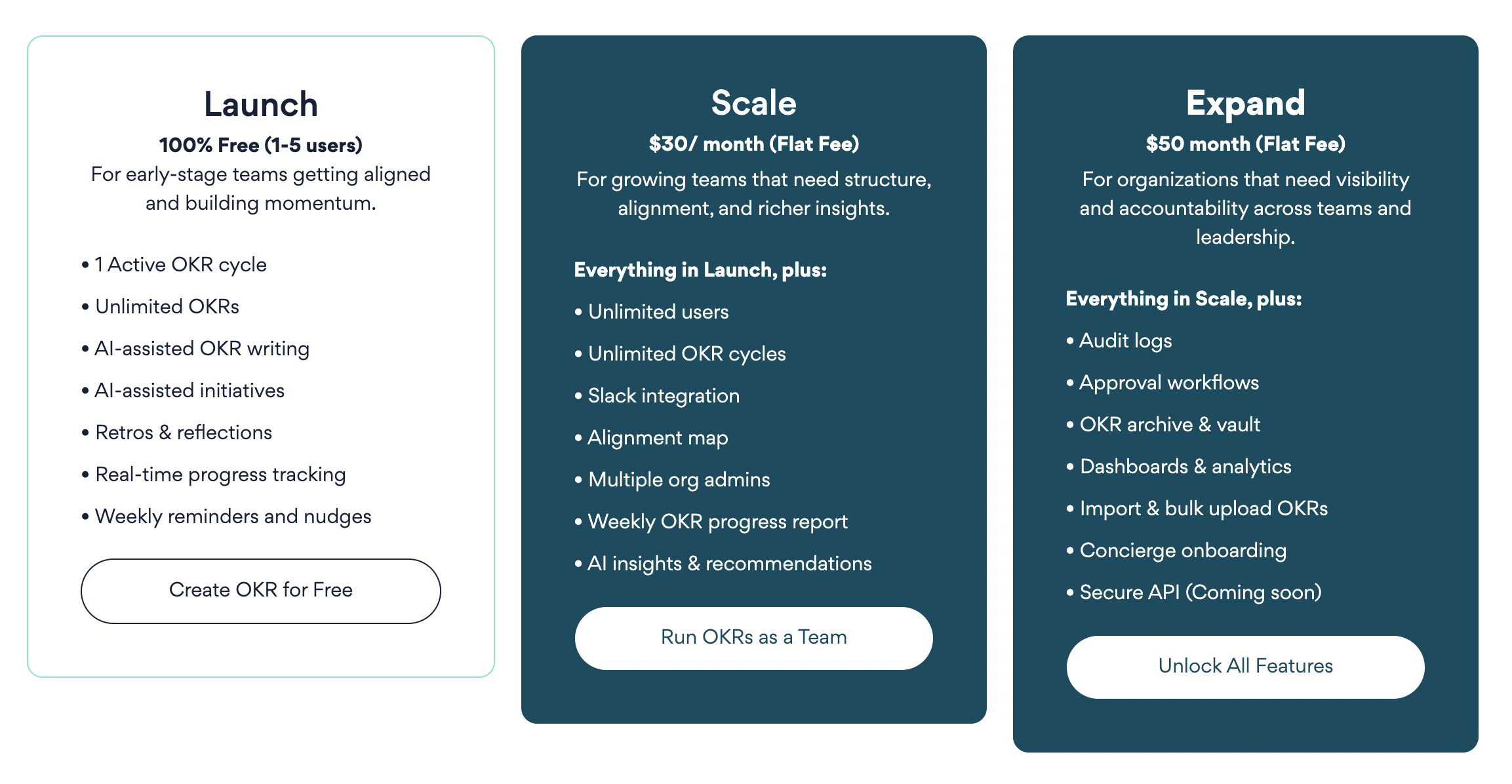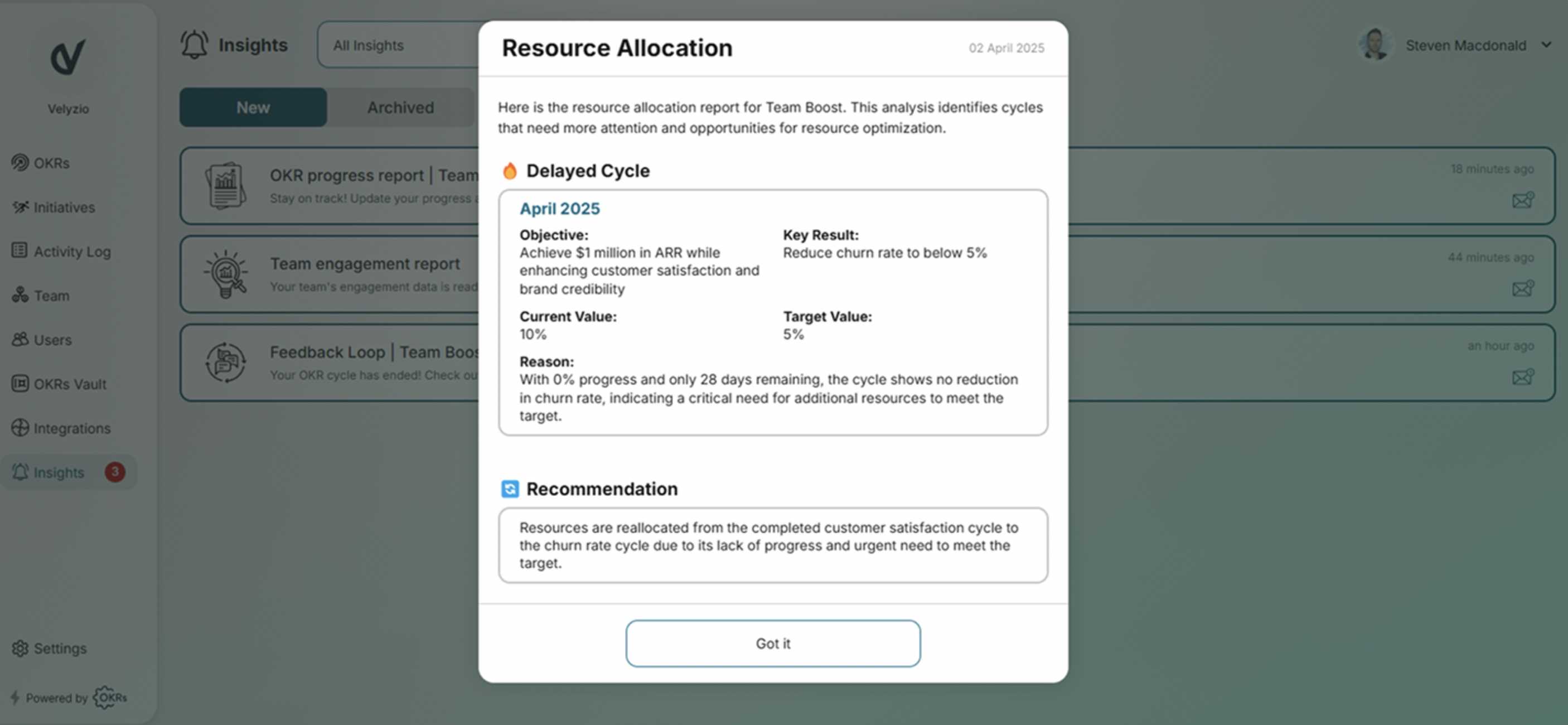Choosing the right OKR software isn’t just about features - it’s about fit.
Especially when you’re leading a startup, your goals shift fast, your team is lean, and you can’t afford tools that slow you down.
OKRs Tool and Profit.co are two popular choices in the space. OKRs Tool focuses on speed, clarity, and lightweight execution, while Profit.co emphasizes structured performance management and enterprise reporting.
In this article, we’ll break down how they compare - on simplicity, features, pricing, AI capabilities, and more - so you can make the right call for your startup.
OKRs Tool vs Profit.co: Which OKR Platform Fits Your Startup?
Both OKRs Tool and Profit.co offer OKR software - but they serve different needs. If you’re a startup founder, the real question is: Which tool fits your speed, structure, and stage of growth?
Use this side-by-side breakdown to quickly spot which platform is a better fit for how your team works today.
Profit.co brings serious enterprise-grade firepower - but that also means complexity, training time, and growing costs. If you’re a startup looking for fast setup, async workflows, and built-in AI to guide your OKRs from draft to execution, OKRs Tool offers more startup leverage with less operational drag.
Simplicity and Setup
OKRs Tool is optimized for lean teams. You sign up, answer a few questions, and it generates role-aware OKRs using AI. You can also set up core KPIs and lightweight performance reviews without additional configuration. Teams can get aligned and move quickly, without needing to become OKR experts.

Profit.co, on the other hand, is a more robust platform. It offers goal-setting, performance reviews, KPIs, tasks, and dashboards — with a strong emphasis on structured, enterprise-style workflows. Getting started takes longer, and most teams will need admin support to implement it properly.
Pricing Model
One of the biggest differences is how each platform charges.
OKRs Tool offers a free tier for up to 5 users, with all features included. After that, it’s a flat team-based rate - you’re not penalized for adding more users. For startups watching cash flow, this predictability matters.

Although their pricing isn’t public, you can find it online. Profit.co uses per-user pricing starting at $9/month. As your team grows, so do the costs - and many key features are locked behind higher plans. For larger orgs, this might be manageable. For early-stage startups, it adds up fast.
AI Capabilities
OKRs Tool leans heavily into AI. It helps you:
- Instantly generate OKRs based on role and business focus
- Suggest new OKRs when current ones are completed early
- Recommend initiatives tied to real progress data
It acts more like a proactive OKR coach than a writing assistant.
Profit.co does include AI support, but it’s mostly for drafting OKRs using templates or structural suggestions. It doesn’t offer initiative recommendations or performance-based guidance.

Workflow and Collaboration
OKRs Tool is built around async workflows. Slack integration means updates and reminders happen where work already happens. It doesn’t try to be your task manager - it complements the stack you already use.
Profit.co offers deeper integrations with tools like OpenAI, Salesforce, Microsoft Teams, and Jira. For companies with complex reporting needs or existing enterprise tools, this offers more control. But it also requires more configuration.
Reporting and Insights
OKRs Tool focuses on simplicity: what’s on track, what’s behind, who owns what — across OKRs, KPIs, and performance reviews. The reporting is streamlined to keep founders and team leads focused on execution, not dashboards.
Profit.co shines here. Its reporting tools are far more advanced, offering heatmaps, KPIs, alignment maps, and boardroom-ready visualizations. For leadership teams who need to track performance across departments, this is a strong advantage.

Where Structure Meets Speed: Real Startup Scenarios
OKRs Tool and Profit.co both aim to help you align goals and track progress. But how do they perform when the startup chaos kicks in? Let’s compare how each platform handles real-world startup challenges across 3 common scenarios:
Scenario 1: You’re moving fast and don’t have time for onboarding.
- OKRs Tool: Setup takes less than 5 minutes. You answer a few questions, and the AI helps you generate OKRs based on your role or team. No training or admin setup required.
- Profit.co: Offers robust onboarding and support - but the learning curve is steeper. It may take a day or two to configure everything properly, especially if you want full reporting or HR features.
Takeaway: For fast-moving startups, OKRs Tool gets you tracking immediately. Profit.co is powerful, but you’ll need to carve out time to get started.
Scenario 2: You need to reset OKRs mid-cycle after a strategy pivot.
- OKRs Tool: Built-in AI helps suggest new OKRs, recommends next steps based on current progress, and adjusts tracking without manual rework.
- Profit.co: Mid-cycle edits are possible, but there’s more structure to navigate. Resetting OKRs might require admin approval or realignment across departments.
Takeaway: OKRs Tool is more flexible and responsive for teams that pivot fast. Profit.co works better if you prefer stable, quarterly planning cycles.
Scenario 3: You’re reporting to investors and need clear metrics.
- OKRs Tool: Clean, focused dashboards that show progress, blockers, and ownership at a glance. Ideal for lightweight reporting or updates.
- Profit.co: Offers deeper reports - heatmaps, KPI maps, OKR alignment trees - that are great for more formal investor or board presentations.
Takeaway: If you want clarity with minimal prep, OKRs Tool keeps things founder-friendly. Profit.co is ideal when you need presentation-grade analytics.
What Profit.co Does Better
Let’s be clear - Profit.co isn’t just for big companies. It does several things really well, especially for teams that need more process, oversight, and long-term planning.
- More automated dashboards: Profit.co offers deeper, highly automated dashboards and visual reporting, which may appeal to teams with formal reporting requirements.
- More comprehensive HR tooling: Profit.co includes performance reviews, 360 feedback, and HR tools designed for larger organizations.
- Enterprise Integrations: If your company already uses tools like Salesforce, Jira, or Microsoft Teams, Profit.co’s integration depth will be valuable.
These features may be overkill for early-stage startups - but for scaleups or orgs with formal goal review processes, they add meaningful value.
Final Thoughts
OKRs Tool and Profit.co both help teams align around goals. But they serve different types of companies.
OKRs Tool is purpose-built for startups: fast setup, built-in AI, no fluff, and simple ways to run OKRs, track KPIs, and support performance conversations without enterprise overhead. As a free OKR tool, it’s ideal if you want a simple, startup-native way to stay focused and execute.
Profit.co is better suited for companies that need deeper visibility, layered goal structures, and HR integration. It offers more power - but requires more setup, cost, and operational maturity to get the most out of it.
If you're just getting your OKRs off the ground, OKRs Tool will help you move faster. If you’re scaling across departments and need process-heavy performance tracking, Profit.co might be the better fit.
Either way, the best OKR platform is the one your team actually uses consistently.






